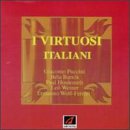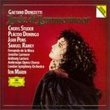| All Artists: Puccini, Bartok Title: 1 Virtuos Members Wishing: 0 Total Copies: 0 Label: Aca Digital Release Date: 12/1/1995 Genre: Classical Styles: Chamber Music, Forms & Genres, Concertos, Serenades & Divertimentos, Instruments, Strings Number of Discs: 1 SwapaCD Credits: 1 UPC: 726072200024 |
Search - Puccini, Bartok :: 1 Virtuos
CD DetailsSimilar CDs |
CD ReviewsEnjoyable music and superlative performance L. C. Gasper | 03/21/2009 (5 out of 5 stars) "Puccini's Crisantemi was written for string quartet, but has more often been performed by string orchestra, as it is here. But, in another sense, not as it is here. The other renditions I have heard by string orchestras have been by relatively large forces, such as the strings of the London Symphony Orchestra. I Virtuosi Italiani include only 17 in their number, and I am now convinced that the number is right, particularly for Crisantemi. The Emerson Quartet have, in my opinion, given us the best performance of this piece in its original form, but something in the music seems to call for an expanded production. However that may be, I find this to be by far the most satisfactory performance I have heard of this lovely little piece by Puccini.
The group also seems just exactly right for Bartók's Romanian Folkdances. These were written for piano and, like Crisantemi, don't seem to work well for a large ensemble. Again, there is something in the music that seems to require an expansion, but not too much. Dance, particularly folk dance, has a kind of small-scale intimacy that is transformed into something different, and not always better, by a large orchestra. Like Puccini's Crisantemi, Hindemith's Trauermusik is an elegy. It is only somewhat longer (eight and a half minutes vs. seven minutes) than Pucccini's piece but is much more complex, consisting of four sections. Crisantemi, on the other hand, is just a theme and trio followed by a short coda which returns to the first theme. The Trauermusik seems to me to lack a basic unity, and I find it much less successful than the Puccini, and particularly so considering it as an elegy. It belies the simplicity of death. Weiner's Divertimento on old Hungarian dances is reminiscent of Hungarian music we have from the pens of Brahms, Liszt, and others, but the native sources are tamed by Weiner. Reaching perhaps too far for an analogy, the feeling I got was almost that when I hear Gershwin's concertos. Someone said that Gershwin dressed up jazz to be a lady and took her into the concert hall. Perhaps much the same thing can be said of Weiner's taking the rather angular, insistent Hungarian folk music and making it behave like proper string orchestra work. The final selection on the disc, Wolf-Ferrari's Serenade in E flat major for Strings, reminds me very much of Rossini. This is the longest piece on this disc, and I Virtuosi Italiani do it every justice. Eric Salzman, in the liner notes, insists that the technique and form is Germanic, and I'm willing to grant that, but the ideas are still Italian. The other renditions I have heard of this serenade have been by German orchestras, who always at some point fall into a bit of sturm und drang, which is perhaps difficult for a large string section to avoid. I Virtuosi Italiani have an appropriately light touch which does not, however, trivialize Wolf-Ferrari's ideas. Now as to the sound: A small ensemble like this is less able to cover an occasional misstep by one player, and you will notice a few places where someone isn't quite exactly on pitch. These are not serious, and by no means ruin the music. I've heard a lot worse from what are very good orchestras. The recording was made at the Villa Delfini, in what was apparently a moderately spacious room, well suited to a group of this size. I find no fault with the audio engineering; the sound is always very clean. One small shortcoming is that each selection is on just one track. There is no good reason the individual movements of Wolf-Ferrari's Serenade, for example, could not each have had its own track. Overall, I consider myself lucky to have been able to secure a copy of this now-rare disc. The music is enjoyable, the playing superlative." |




